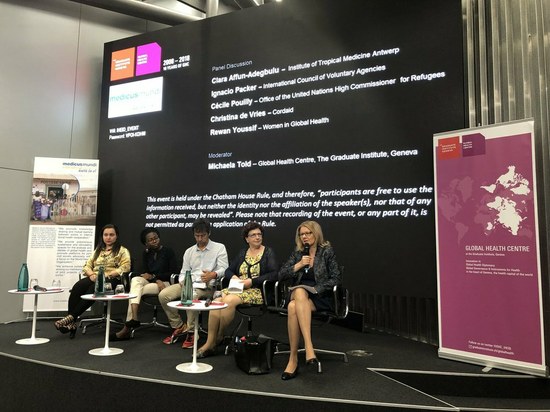 After the scandals of sexual abuse and exploitation by staff of organizations working in humanitarian aid and development cooperation reported and discussed in early 2018, assessments and answers about how to deal with such misbehaviour need to be found at all levels: By the individual, by the institution (what values, norms, and regulations can they refer to in order to prevent such cases and, if they occur, to deal with them in an adequate way?), and by the sector and society as a whole.
After the scandals of sexual abuse and exploitation by staff of organizations working in humanitarian aid and development cooperation reported and discussed in early 2018, assessments and answers about how to deal with such misbehaviour need to be found at all levels: By the individual, by the institution (what values, norms, and regulations can they refer to in order to prevent such cases and, if they occur, to deal with them in an adequate way?), and by the sector and society as a whole.
However, the development and humanitarian sector is not so much advanced in addressing misconduct of expatriate workers or local partners as for instance in dealing with frauds. We have lots of checks and balances, protocols, reporting criteria, etc. for fraud, but less for misconduct.
Currently, both at the international and the national level, main actors are coming together to develop joint responses and protocols. This is now work in progress, but moving forward with urgency
The event
Our public side event to the MMI Annual General Assembly provided a space for asking critical questions and sharing assessments on what is to be done to prevent and properly respond to particular cases of sexual exploitation and misconduct. But the dialogue went beyond this: What is to be done to address the root causes?
This led to the following rough structure of the conversation:
- Prevent sexual exploitation and abuse and respond adequately: A necessity and challenge
What needs to be done to operationalize a “survivor centred approach” in dealing with sexual harassment and abuse in humanitarian aid and development cooperation? Instruments proposed include active prevention, reporting and compliance, sensitivity training, and community based complaints mechanisms. However, such instruments, mainly as they are now being imposed by donors after the cases reported in early 2018, are a big institutional challenge for small organizations. So what can they do? How to operationalize a culture of integrity throughout the heterogonous sector?
- Most of all: Address root causes of sexual exploitation and abuse
Sexual exploitation and abuse in the field of humanitarian aid and development cooperation is rooted in power imbalances related to sexism, racism, neo-colonial ideas, and global power structures. Unless these root causes are made central to the discussions, any solutions will remain reactive and superficial.
Panellists
- Cécile Pouilly, UNHCR
- Clara Affun-Adegbulu, ITM Antwerp
- Ignacio Packer, ICVA
- Jan Kees den Bakker, Cordaid
- Rewan Youssif, Women in Global Health
Moderator: Michaela Told, Graduate Institute
Format and outcome
The meeting was open to representatives of institutions working in the field of health cooperation, to delegates at the 71st World Health Assembly and to all others interested.
We wanted to create a public, but protected space for an intensive dialogue on a sensitive matter. The meeting was therefore not webcast. Participants were requested not to publish/tweet any quotes without explicit consent of the speaker.
There were not quite as many participants as expected (this time we lost the “WHA Saturday” gamble), but may-be it was just the size of the group that led to a strong energy in the room. It was good to experience the intensity and honesty of the conversation, and it was good to see that we had the “right” people (personalities, experiences, contributions) on the panel – and that the other colleagues who made it to the meeting were attentive, engaged, contributing.
So thanks to all who contributed and who helped in the preparation of the meeting, with initial references and assessments, with proposals, inspiration and commitment. And thanks again to the great team at the Global Health Centre for all the support and for making us feel welcome.
The MMI working group on Effective Health Cooperation will continue to provide a platform where actors in health cooperation can critically reflect their own practices and approaches. And there is a lot to be done, both regarding #AidToo and beyond.
Organizers
- Medicus Mundi International – Network Health for All
- Global Health Centre, Graduate Institute Geneva
MMI Network members as co-organizers:
- Cordaid
- Institute of Tropical Medicine Antwerp
- Medicus Mundi Switzerland
Contact
- Thomas Schwarz, Secretariat, Medicus Mundi International Network
schwarz@medicusmundi.org, phone +41 61 383 18 11, text +41 79 645 01 37
MMI Health Cooperation Workshops
Since 2014, The MMI health cooperation workshops in Geneva take place on the Saturday of the World Health Assembly week as side events to both the MMI Annual Assembly and to the World Health Assembly. The topics of the last years:
- 2014: Working towards Health for All: What’s the count?
What role for civil society action and networking? - 2015: A luta continua! Strengthening or weakening health systems?
- 2016: Promoting access to health in fragile contexts: What role for international cooperation?
- 2017: Health Cooperation beyond aid
Network events in Geneva, May 2018
Learn more about the Annual General Assembly of the MMI Network and our activities during the 71th World Health Assembly
